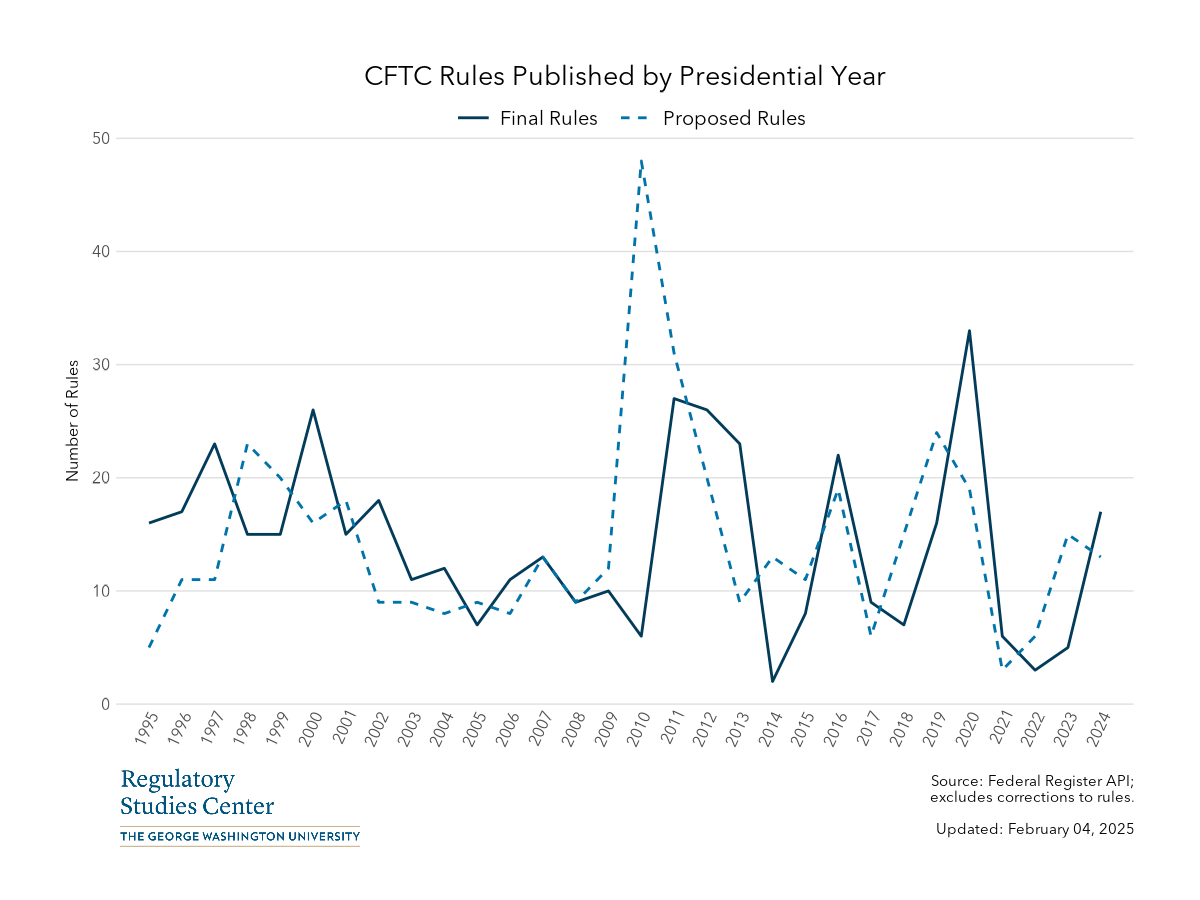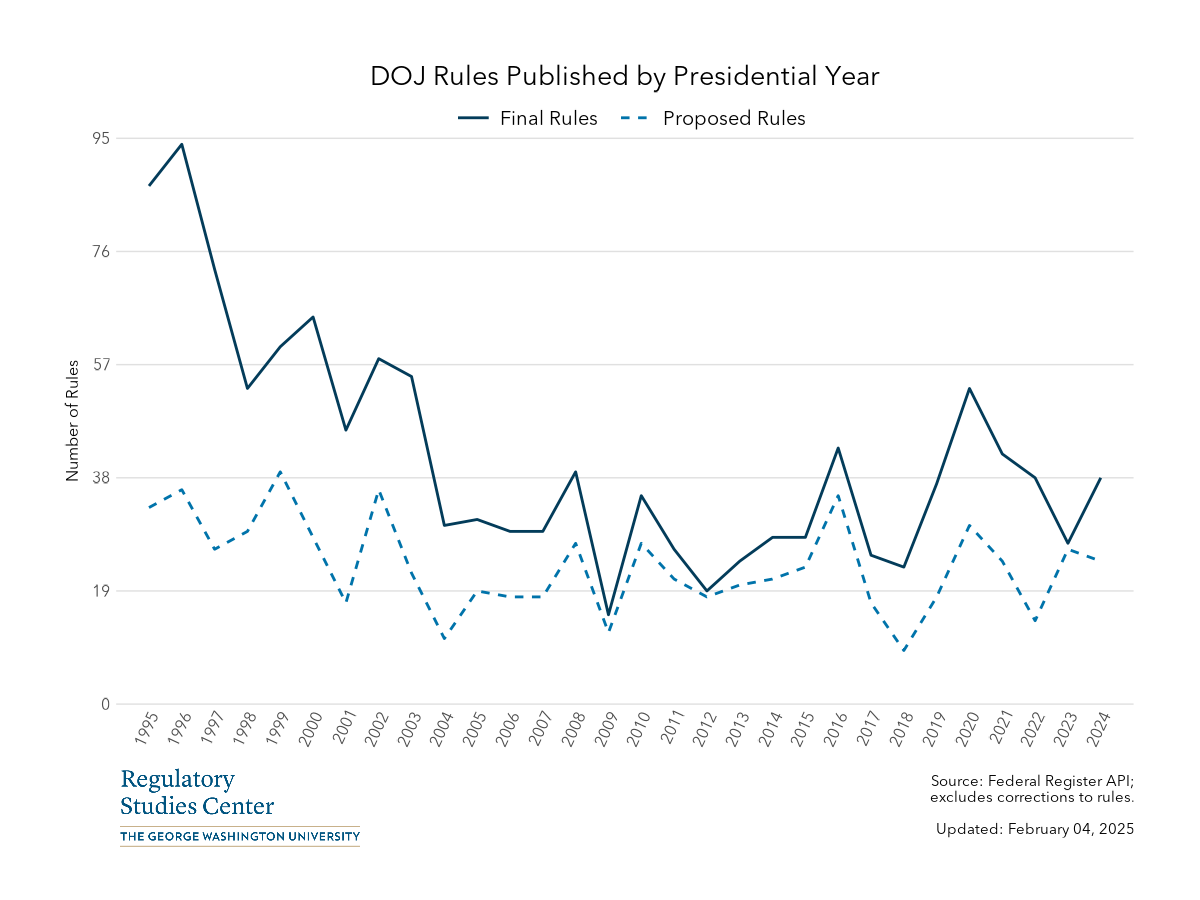RegStats: Rules by Agency
The following graphs summarize rulemaking activity by presidential year for selected federal agencies. Visualizations showing the number of proposed and final rules published in the Federal Register each year are available for every agency shown here. Visualizations showing the number of economically significant final rules published annually are available for executive branch agencies. Independent regulatory agencies are not required to define their rules as significant because they are broadly exempt from Executive Order 12866. Consequently, there is no data available to create visualizations of economically significant final rules for independent regulatory agencies.
Suggested Citation:
The George Washington University Regulatory Studies Center, "CHART OR DATASET TITLE" retrieved "ACCESS DATE", go.gwu.edu/regstudies.
The source code for the data and charts is available on GitHub. If you would like to see us include other data or have questions about the information presented here, please email regulatorystudies![]() gwu [dot] edu.
gwu [dot] edu.
- Table of Contents
Commodity Futures Trading Commission (CFTC)
Consumer Financial Protection Bureau (CFPB)
Consumer Product Safety Commission (CPSC)
Department of Agriculture (USDA)
Department of Commerce (DOC)
Department of Defense (DOD)
Department of Education (ED)
Department of Energy (DOE)
Department of Health and Human Services (HHS)
Department of Homeland Security (DHS)
Department of Housing and Urban Development (HUD)
Department of the Interior (DOI)
Department of Justice (DOJ)
Department of Labor (DOL)
Department of State (DOS)
Department of Transportation (DOT)
Department of the Treasury (Treasury)
Department of Veterans Affairs (VA)
Environmental Protection Agency (EPA)
Federal Communications Commission (FCC)
Federal Deposit Insurance Corporation (FDIC)
Federal Housing Finance Agency (FHFA)
Federal Maritime Commission (FMC)
Federal Trade Commission (FTC)
Nuclear Regulatory Commission (NRC)
Postal Regulatory Commission (PRC)
Securities and Exchange Commission (SEC)
Small Business Administration (SBA)
Commodity Futures Trading Commission
The Commodity Futures Trading Commission was established in 1974 to regulate U.S. derivatives markets, which includes futures, swaps, and certain kinds of options.
Consumer Financial Protection Bureau
The Consumer Financial Protection Bureau was created in 2011 with the mission to promote fairness and transparency for mortgages, credit cards, and other consumer financial products and services.
Consumer Product Safety Commission
The Consumer Product Safety Commission was established in 1973 to promote the safety of consumer products by coordinating recalls, developing uniform safety standards, and conducting research into product-related illness and injury.
Department of the Treasury
The Department of the Treasury operates and maintains systems that are critical to the nation's financial infrastructure, such as the production of coin and currency, the disbursement of payments to the American public, the collection of taxes, and the borrowing of funds necessary to run the federal government.
Department of Veterans Affairs
The Department of Veterans Affairs is responsible for administering benefit programs for veterans, their families, and their survivors. These benefits include pension, education, disability compensation, home loans, life insurance, vocational rehabilitation, survivor support, medical care, and burial benefits.
Federal Communications Commission
The Federal Communications Commission is an independent agency that regulates communications by radio, television, wire, satellite, and cable.
Federal Deposit Insurance Corporation
The Federal Deposit Insurance Corporation is an independent agency that maintains stability and public confidence in the nation's financial system by: insuring deposits; examining and supervising financial institutions for safety and soundness and consumer protection; making large and complex financial institutions resolvable; and managing the resolution of failed banks.
Federal Housing Finance Agency
The Federal Housing Finance Agency was established in 2008 to oversee the secondary mortgage markets, supervise housing-related government-sponsored enterprises, and promote a stronger, safer housing finance system.
Federal Maritime Commission
The Federal Maritime Commission regulates the waterborne foreign commerce of the United States. It ensures that oceanborne trades are open to all on fair and equitable terms and protects against concerted activities and unlawful practices.
Federal Trade Commission
The Federal Trade Commission is an independent agency that enforces civil antitrust law. Its mission is to prohibit business practices that are anticompetitive, deceptive, or unfair to consumers and to promote informed consumer choice.
Nuclear Regulatory Commission
The Nuclear Regulatory Commission licenses and regulates civilian use of nuclear energy to protect public health and safety and the environment.
Postal Regulatory Commission
The Postal Regulatory Commission develops and implements a modern system of postal rate regulation.
Securities and Exchange Commission
The Securities and Exchange Commission is an independent agency with a mandate to protect investors, maintain fair, orderly and efficient markets, and facilitate capital formation.














































